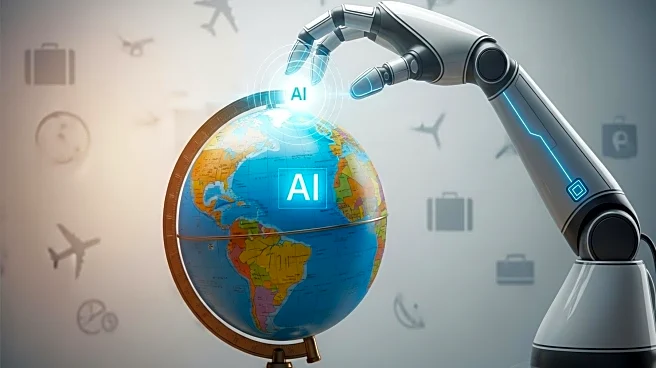What is the story about?
What's Happening?
A recent global survey conducted by RateHawk, a B2B travel platform, reveals mixed feelings among travel agents regarding the increasing influence of AI in the travel industry. Released on World Tourism Day, the study indicates that 44% of travel professionals view AI as a potential threat, fearing it could replace the human element crucial for creating personalized travel experiences. Despite these concerns, AI adoption in the travel sector is projected to handle $78 billion in revenue by 2026, with North America showing a more positive outlook towards AI as a tool for enhancing travel services. The survey highlights geographical differences in perceptions, with pessimism peaking in Asia and the Gulf Cooperation Council countries, while Europe and Latin America exhibit more optimism.
Why It's Important?
The integration of AI in the travel industry is reshaping how travel services are offered, with implications for job security and service personalization. While AI offers opportunities for increased efficiency and ultra-personalized recommendations, it also poses challenges for travel agents who fear job displacement. The differing regional attitudes towards AI reflect broader economic and cultural factors, influencing how AI is perceived and adopted. As AI continues to evolve, travel agents must adapt to new technologies to remain competitive, balancing the benefits of AI with the need to maintain the human touch in travel planning.
What's Next?
Travel agents and industry stakeholders are likely to continue exploring ways to integrate AI without compromising the human element of travel services. This may involve leveraging AI for tasks that enhance storytelling and customer engagement while maintaining the personal connections that are vital to the industry. As AI adoption grows, travel professionals will need to focus on developing skills that complement AI technologies, ensuring they can offer unique and memorable travel experiences.
Beyond the Headlines
The rise of AI in travel presents ethical and cultural considerations, particularly in regions where luxury travel services are prevalent. The potential for AI to disrupt traditional travel roles raises questions about the future of employment in the industry and the preservation of cultural experiences. As AI becomes more integrated, travel agents may need to redefine their roles, focusing on areas where human expertise and creativity are irreplaceable.















